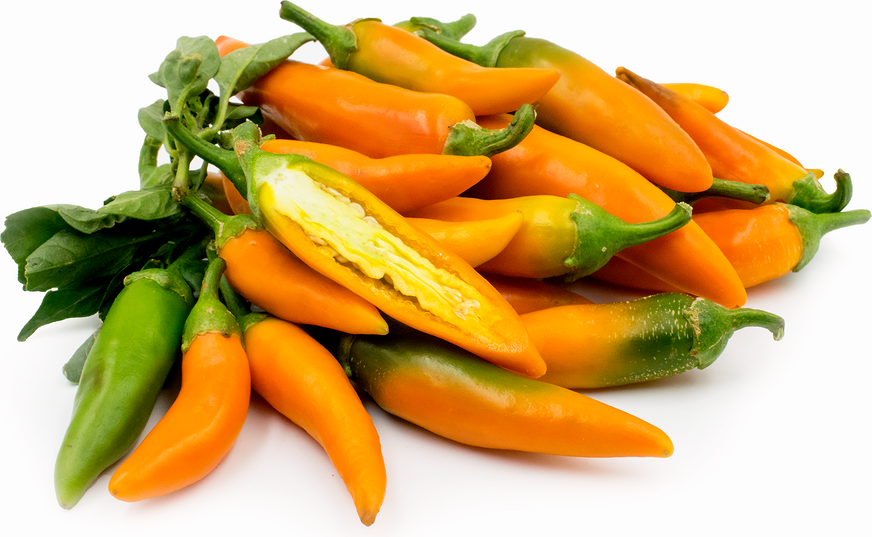


Bulgarian Carrot Chile Peppers
Estimated Inventory, 5 lbs : 0
Description/Taste
Bulgarian Carrot chile peppers are elongated, curved to straight pods, averaging 5 to 10 centimeters in length, and have a conical, tapered shape with a distinct point on the non-stem end. The skin is smooth, glossy and thick, ripening from dark green to bright orange when mature. Underneath the surface, the flesh is thin, crisp, and aqueous, encasing a central cavity filled with a few round, flat, cream-colored seeds. Bulgarian Carrot chile peppers are known for their crunchy nature and have a fruity, tangy, and slightly sweet flavor mixed with an instant, moderate to hot level of spice that lingers in the back of the throat.
Seasons/Availability
Bulgarian Carrot chile peppers are available year-round, with a peak season in the summer through fall.
Current Facts
Bulgarian Carrot chile peppers, botanically classified as Capsicum annuum, are an heirloom variety growing on small plants reaching forty-five centimeters in height and are members of the Solanaceae or nightshade family. Native to Bulgaria, the peppers are believed to be a cross of a Caribbean habanero varietal and a Bulgarian pepper and are also commonly referred to as Hot Carrot peppers or Shipka peppers, which is a name that is highly debated. Some experts believe the term Shipka is named after a small town in central Bulgaria while other experts trace it back to a Bulgarian term for rose hips. The English name of the pepper comes from its striking resemblance to a bright orange baby carrot. Despite its many names, Bulgarian Carrot chile peppers are a moderately hot variety ranging 5,000 to 30,000 SHU on the Scoville scale and are favored for their crunchy texture and tangy spice.
Nutritional Value
Bulgarian Carrot chile peppers are an excellent source of vitamin C, beta carotene, and vitamin A, which are antioxidants that can help reduce inflammation. The peppers also contain potassium, magnesium, iron, and a chemical compound known as capsaicin, which is what gives the pepper the feeling of spice or heat.
Applications
Bulgarian Carrot chile peppers are best suited for both raw and cooked applications such as roasting, stir-frying, and grilling. The pepper is known for its crunchy texture and is used in preparations that will showcase the crunch. Bulgarian Carrot chile peppers can be chopped and added to salsas, sauces, and chutneys, or they can be tossed into salads. The peppers are also popularly used as a pizza topping, grilled and served with barbequed meats, baked into bread, or stir-fried with other vegetables for added spice. In addition to cooked applications, the heat and crispness of Bulgarian Carrot chile peppers are ideal for pickling. Bulgarian Carrot chile peppers pair well with broccoli, cauliflower, snap peas, bell peppers, corn, onions, garlic, beans, rice, quinoa, and meats such as pork, beef, and poultry. The peppers will keep up to one week when stored whole, unwashed, and loosely wrapped in plastic in the refrigerator.
Ethnic/Cultural Info
Legend has it that Bulgarian Carrot chile peppers were smuggled out of Russia sometime before the “iron curtain” came down in the late 1980s. This “curtain” was both a metaphorical and physical divide between eastern, communist-controlled countries and western Europe in an effort to block the communist countries from outside influences. It is unknown when the seeds of the pepper plant were smuggled over the border and how they were successfully carried, but after its escape, the pepper was spread across Europe, into the Caribbean, and later introduced to the United States.
Geography/History
Bulgarian Carrot chile peppers are believed to be native to Bulgaria, which is a country that lies along the Black Sea north of Turkey and to the east of Greece in southeastern Europe. It is also believed that the plant was heavily cultivated in Hungary as an ornamental and culinary variety. The pepper remained localized to Bulgaria and Hungary until the sometime before the 1980s, and then it was introduced into Europe and the New World. Today Bulgarian Carrot chile peppers are not commercially grown and are primarily available by seed through online catalogs and through small farms that grow the variety for local farmers markets in Europe, Asia, and the United States.




